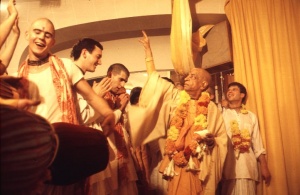SB 9.15.41: Difference between revisions
m (1 revision(s)) |
(Vanibot #0054 edit - transform synonyms into clickable links, which search similar occurrences) |
||
| (One intermediate revision by one other user not shown) | |||
| Line 1: | Line 1: | ||
{{info | {{info | ||
|speaker=Jamadagni | |speaker=Jamadagni | ||
|listener=Lord | |listener=Lord Paraśurāma the Supreme Personality of Godhead | ||
}} | }} | ||
[[Category:Srimad-Bhagavatam - Canto 09 Chapter 15]] | |||
[[Category:Bhagavatam Verses Spoken by Jamadagni - Vanisource|091541]] | |||
<div style="float:left">'''[[Srimad-Bhagavatam]] - [[SB 9|Ninth Canto]] - [[SB 9.15: Parasurama, the Lord's Warrior Incarnation|Chapter 15: Paraśurāma, the Lord's Warrior Incarnation]]'''</div> | |||
<div style="float:right">[[File:Go-previous.png|link=SB 9.15.40]] '''[[SB 9.15.40]] - [[SB 9.16.1]]''' [[File:Go-next.png|link=SB 9.16.1]]</div> | |||
{{RandomImage}} | |||
==== TEXT 41 ==== | ==== TEXT 41 ==== | ||
<div | <div class="verse"> | ||
rājño mūrdhābhiṣiktasya | :rājño mūrdhābhiṣiktasya | ||
vadho brahma-vadhād guruḥ | :vadho brahma-vadhād guruḥ | ||
tīrtha-saṁsevayā cāṁho | :tīrtha-saṁsevayā cāṁho | ||
jahy aṅgācyuta-cetanaḥ | :jahy aṅgācyuta-cetanaḥ | ||
</div> | </div> | ||
| Line 17: | Line 22: | ||
==== SYNONYMS ==== | ==== SYNONYMS ==== | ||
<div | <div class="synonyms"> | ||
''[//vanipedia.org/wiki/Special:VaniSearch?s=rājñaḥ&tab=syno_o&ds=1 rājñaḥ]'' — of the king; ''[//vanipedia.org/wiki/Special:VaniSearch?s=mūrdha&tab=syno_o&ds=1 mūrdha]-[//vanipedia.org/wiki/Special:VaniSearch?s=abhiṣiktasya&tab=syno_o&ds=1 abhiṣiktasya]'' — who is noted as the emperor; ''[//vanipedia.org/wiki/Special:VaniSearch?s=vadhaḥ&tab=syno_o&ds=1 vadhaḥ]'' — the killing; ''[//vanipedia.org/wiki/Special:VaniSearch?s=brahma&tab=syno_o&ds=1 brahma]-[//vanipedia.org/wiki/Special:VaniSearch?s=vadhāt&tab=syno_o&ds=1 vadhāt]'' — than killing a ''brāhmaṇa''; ''[//vanipedia.org/wiki/Special:VaniSearch?s=guruḥ&tab=syno_o&ds=1 guruḥ]'' — more severe; ''[//vanipedia.org/wiki/Special:VaniSearch?s=tīrtha&tab=syno_o&ds=1 tīrtha]-[//vanipedia.org/wiki/Special:VaniSearch?s=saṁsevayā&tab=syno_o&ds=1 saṁsevayā]'' — by worshiping the holy places; ''[//vanipedia.org/wiki/Special:VaniSearch?s=ca&tab=syno_o&ds=1 ca]'' — also; ''[//vanipedia.org/wiki/Special:VaniSearch?s=aṁhaḥ&tab=syno_o&ds=1 aṁhaḥ]'' — the sinful act; ''[//vanipedia.org/wiki/Special:VaniSearch?s=jahi&tab=syno_o&ds=1 jahi]'' — wash out; ''[//vanipedia.org/wiki/Special:VaniSearch?s=aṅga&tab=syno_o&ds=1 aṅga]'' — O my dear son; ''[//vanipedia.org/wiki/Special:VaniSearch?s=acyuta&tab=syno_o&ds=1 acyuta]-[//vanipedia.org/wiki/Special:VaniSearch?s=cetanaḥ&tab=syno_o&ds=1 cetanaḥ]'' — being fully Kṛṣṇa conscious. | |||
</div> | </div> | ||
| Line 24: | Line 29: | ||
==== TRANSLATION ==== | ==== TRANSLATION ==== | ||
<div | <div class="translation"> | ||
My dear son, killing a king who is an emperor is more severely sinful than killing a brāhmaṇa. But now, if you become Kṛṣṇa conscious and worship the holy places, you can atone for this great sin. | My dear son, killing a king who is an emperor is more severely sinful than killing a brāhmaṇa. But now, if you become Kṛṣṇa conscious and worship the holy places, you can atone for this great sin. | ||
</div> | </div> | ||
| Line 31: | Line 36: | ||
==== PURPORT ==== | ==== PURPORT ==== | ||
<div | <div class="purport"> | ||
One who fully surrenders to the Supreme Personality of Godhead is freed from all sins (ahaṁ tvāṁ sarva-pāpebhyo mokṣayiṣyāmi ([[BG 18.66]])). From the very day or moment he fully surrenders to Śrī Kṛṣṇa, even the most sinful person is freed. Nonetheless, as an example, Jamadagni advised his son Paraśurāma to worship the holy places. Because an ordinary person cannot immediately surrender to the Supreme Personality of Godhead, he is advised to go from one holy place to another to find saintly persons and thus gradually be released from sinful reactions. | One who fully surrenders to the Supreme Personality of Godhead is freed from all sins (''ahaṁ tvāṁ sarva-pāpebhyo mokṣayiṣyāmi'' ([[BG 18.66 (1972)|BG 18.66]])). From the very day or moment he fully surrenders to Śrī Kṛṣṇa, even the most sinful person is freed. Nonetheless, as an example, Jamadagni advised his son Paraśurāma to worship the holy places. Because an ordinary person cannot immediately surrender to the Supreme Personality of Godhead, he is advised to go from one holy place to another to find saintly persons and thus gradually be released from sinful reactions. | ||
</div> | |||
''Thus end the Bhaktivedanta purports of the Ninth Canto, Fifteenth Chapter, of the Śrīmad-Bhāgavatam, entitled "Paraśurāma, the Lord's Warrior Incarnation."'' | |||
: | <div style="float:right; clear:both;">[[File:Go-previous.png|link=SB 9.15.40]] '''[[SB 9.15.40]] - [[SB 9.16.1]]''' [[File:Go-next.png|link=SB 9.16.1]]</div> | ||
__NOTOC__ | __NOTOC__ | ||
__NOEDITSECTION__ | |||
Latest revision as of 23:45, 18 February 2024

A.C. Bhaktivedanta Swami Prabhupada
TEXT 41
- rājño mūrdhābhiṣiktasya
- vadho brahma-vadhād guruḥ
- tīrtha-saṁsevayā cāṁho
- jahy aṅgācyuta-cetanaḥ
SYNONYMS
rājñaḥ — of the king; mūrdha-abhiṣiktasya — who is noted as the emperor; vadhaḥ — the killing; brahma-vadhāt — than killing a brāhmaṇa; guruḥ — more severe; tīrtha-saṁsevayā — by worshiping the holy places; ca — also; aṁhaḥ — the sinful act; jahi — wash out; aṅga — O my dear son; acyuta-cetanaḥ — being fully Kṛṣṇa conscious.
TRANSLATION
My dear son, killing a king who is an emperor is more severely sinful than killing a brāhmaṇa. But now, if you become Kṛṣṇa conscious and worship the holy places, you can atone for this great sin.
PURPORT
One who fully surrenders to the Supreme Personality of Godhead is freed from all sins (ahaṁ tvāṁ sarva-pāpebhyo mokṣayiṣyāmi (BG 18.66)). From the very day or moment he fully surrenders to Śrī Kṛṣṇa, even the most sinful person is freed. Nonetheless, as an example, Jamadagni advised his son Paraśurāma to worship the holy places. Because an ordinary person cannot immediately surrender to the Supreme Personality of Godhead, he is advised to go from one holy place to another to find saintly persons and thus gradually be released from sinful reactions.
Thus end the Bhaktivedanta purports of the Ninth Canto, Fifteenth Chapter, of the Śrīmad-Bhāgavatam, entitled "Paraśurāma, the Lord's Warrior Incarnation."